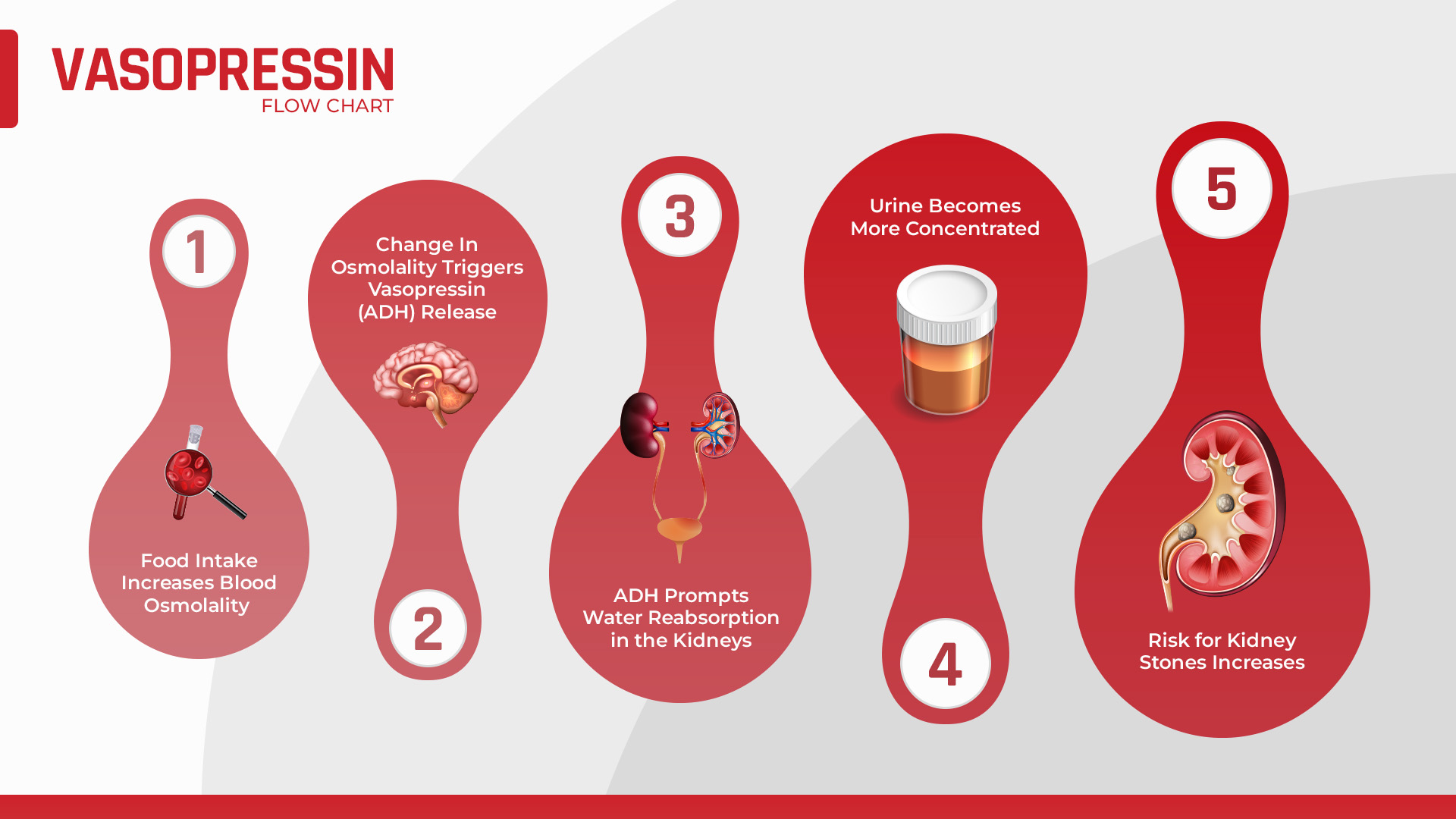Continuing with our theme of why your doctor recommends more water for kidney stones. This article will discuss the impact of proper hydration on a hormone called vasopressin, also known as the antidiuretic hormone (ADH). Hydration levels have a direct effect on ADH, which controls urine concentration. And, as we know from the other blog in this series on Urine Osmolality, urine concentration is directly linked to kidney stone risk.
WHY YOU EXCRETE VASOPRESSIN
The neurons within your brain that produce vasopressin are very responsive to changes in blood osmolality. Osmolality measures particle concentration of things like sodium, glucose, and other blood substances, which we discussed in a previous blog. So even as little as a two mOsm/L increase in blood osmolality will release ADH, triggering water reabsorption into the kidney, which returns blood concentration to baseline.

Nicotine, opiates, medications, and hypoglycemia (low levels of glucose in the blood) can also trigger ADH release. Additionally, chemicals in the body, such as angiotensin II, that help manage blood pressure promote the production of ADH. On the other hand, substances like ethanol (used in beer, etc.) reduce vasopressin release, which explains why drunk people tend to urinate more.
Vasopressin is also released during times of fluid loss. During fluid loss, receptors will sense low blood pressure in the heart’s left atrium, the carotid artery of the neck, and the aortic arch. As a result, these receptors will send signals to the nerves (vagus nerve), suggesting the release of ADH. Conversely, the increase in fluid volume will reduce ADH.
HOW DOES VASOPRESSIN WORK?
Vasopressin binds to the kidneys’ principal cells within the late distal tubule (the final functional segment) and the collecting ducts. But, first, ADH binds with the V2R (Vasopressin V2 receptor) on these cells, activating adenylate cyclase. This enzyme is a second messenger that regulates normal body responses, including sugar and fat metabolism.
Then, vasopressin will signal the aquaporin-2 (AQP2) gene, found in the collecting ducts, to make a protein called aquaporin-2, which forms a water channel that carries water molecules across cell membranes. This water channel allows water to move freely into the cells. As a result, the body will conserve water during dehydration or blood loss, but the urine will be more concentrated.
WHY VASOPRESSIN IS SO IMPORTANT
Vasopressin release directly impacts urine concentration. The more concentrated your urine, the higher the level of particles such as calcium, oxalate, phosphate, and others that can be found. For kidney stones to form, they require the right ingredients (particles) and enough time to allow for crystallization. So, the more ADH (vasopressin) released, the more highly concentrated your urine will become and, thus, the higher your risk for kidney stone formation.
Your risk for kidney stones increases even more if you eat a diet high in stone-forming particles such as oxalate. Or a diet that promotes alkaline urine (pH >7.5) that triggers calcium and phosphate ions to bind together. Sadly, most mainstream media and medical practitioners today promote these diets by emphasizing eating more plant-based. But, unfortunately, going more plant-based is NOT the correct diet for people who form kidney stones.
MANAGING VASOPRESSIN
The best way to manage vasopressin (ADH) levels is by drinking enough water. When you are hydrated, ADH is not released, and urine concentration remains normal. The average ADH levels in the blood ranges from 1 to 5 pg/mL or 0.9 to 4.6 pmol/L (≤0.005 mg/L).
The impact of vasopressin on urine concentration is a primary reason why doctors and urologists recommend drinking more water. Especially for people suffering from kidney stones. As simple as this sounds, there is sound reasoning behind it!
If you’re looking for tips and strategies to drink more water throughout your day, please read our blog on hydration. This will help decrease your risk for kidney stones.


Responses